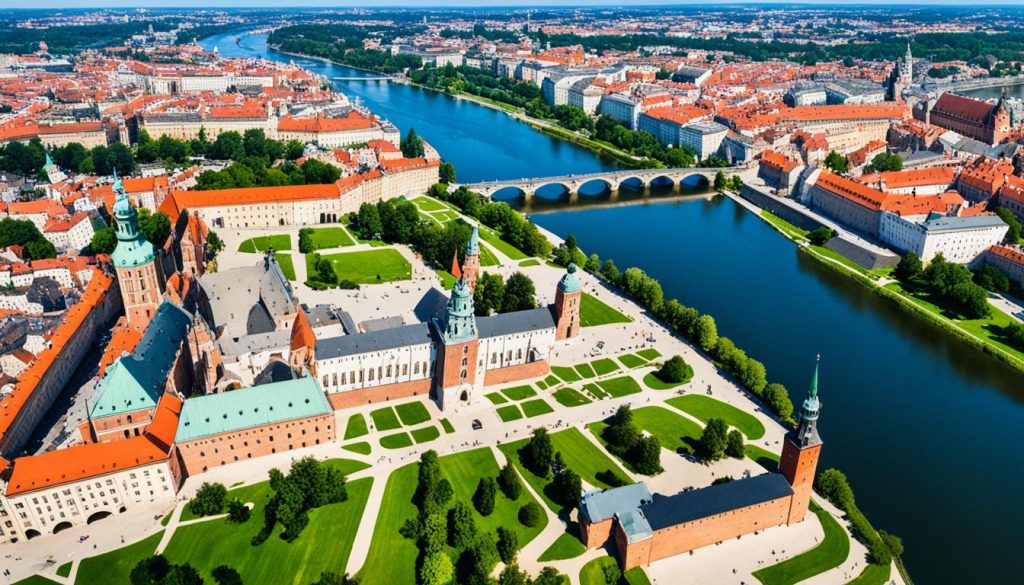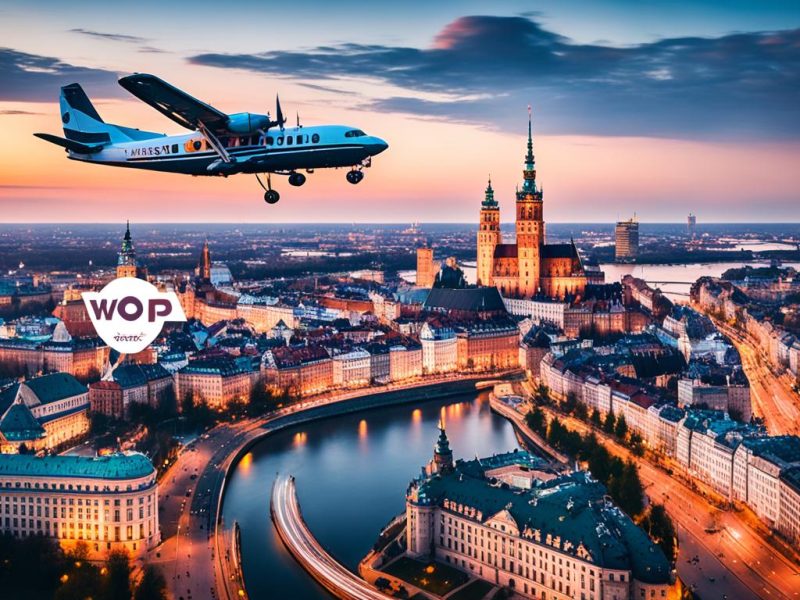Poland is rich in culture, history, and attractions that attract worldwide visitors. The country pulsates with Polish culture. This includes both ancient traditions and modern arts.
Exploring Poland’s history is like travelling through time. It features landmarks that are key to Europe’s story. A trip to Poland is filled with new discoveries. You’ll see lively cities and peaceful countryside views. Its charm is undeniable.
Poland’s tourism connects people with its impactful past. It’s a moving and enriching experience. It invites you to become part of its story. This blend of past and present is uplifting.
In Poland, you can dive into the vibrant city life or enjoy nature’s beauty. It’s welcoming to all. Get ready for a memorable journey. There’s so much to see, hear, and feel in Poland.
Key Takeaways
- Embrace the vibrant traditions and contemporary arts that define Polish culture.
- Deep dive into the history of Poland, which is integral to the European continent’s story.
- Experience a broad spectrum of attractions in Poland, from urban centres to pristine natural surroundings.
- Understand the importance of Poland tourism for a comprehensive cultural and historical exploration.
- Grasp why a visit to Poland offers a rich, multi-dimensional travel experience.
The Rich Tapestry of Polish Culture
Poland’s culture is a vibrant mix of traditions, customs, folklore, and literature. It is like a colourful quilt, each piece telling its own story. This rich blend is not just for locals. It invites everyone to explore its beauty and depth.
Traditions and Customs of Poland
Poland’s year is filled with special celebrations, each adding its own thread to the nation’s social tapestry. The Wianki festival brings the summer solstice to life with flowers. All Saints’ Day offers a quiet beauty with candlelit skies. These events show the depth of the Polish spirit.
The Influence of Folklore and Literature
At the heart of Poland’s culture, icons like Adam Mickiewicz have left a strong mark. His “Pan Tadeusz” remains a cultural pillar. The tales of mythical beings and heroes enrich Poland’s stories and literary fame.
Contemporary Arts and Media Landscape
Today’s Poland is alive with arts and culture, backed by institutions like the National Museum in Warsaw. The Warsaw Film Festival highlights the country’s creativity. Polish media shines on the global stage. Music and arts reflect a nation that cherishes its past while embracing change.
A Journey Through Poland’s Historical Landmarks
Exploring Poland’s historical landmarks takes us through a rich, layered history. We start at the old roots of Polish kingdoms. Then, we move to the energetic democracy of today’s Poland. Each period adds to a story that shaped this country. Poland’s change from old lands to thriving republics shows major shifts in Europe. It makes Poland a key place for cultural and political changes.

Centuries of History: From Kingdoms to Republics
Poland’s story is highlighted by the grand times of its kingdoms. During this time, royal power led the nation. Then, came the Polish republics, showing the people’s fight for democracy. These eras show deep changes and Poland’s role in Europe’s history. They add to Poland’s unique story in Europe.
World Heritage Sites: Castles and Urban Ensembles
Poland has many World Heritage Sites, with history in every castle and ancient city center. Places like the famous Wawel Castle show off Poland’s cultural riches. They tell of the achievements and big moments that made Poland what it is today.
Table: Poland’s World Heritage Sites and Their Significance
| Site | Location | Era | Significance |
|---|---|---|---|
| Wawel Castle | Kraków | Medieval | Royal residence and symbol of Poland’s monarchical history |
| Historic Centre of Warsaw | Warsaw | Medieval – Modern | Phoenix city, reconstructed after WWII, testimony to resilience |
| Auschwitz Birkenau | Oświęcim | 20th Century | Memorial to the victims of the Holocaust and WWII atrocities |
| Medieval Town of Toruń | Toruń | Medieval | Well-preserved example of a medieval European trading town |
The Importance of Poland in European History
Looking at Poland’s history shows its key role in Europe. From its Partition to battling communism, Poland has been crucial. Its landmarks tell not just a national but a broad European story. Wars, peace, and freedom are all parts of it. Today, as a member of the European Union, Poland’s heritage still impacts Europe.
Discover Poland
When you think of Poland, picture walking through ancient towns and lush forests. Feel the country’s vibrant culture. This guide points out the top Polish attractions. It shows the beautiful Polish landscapes you’ll see on your trip.
The Polish landscapes are stunning, from serene lakes to majestic mountains. The north has the Baltic Sea’s coast, while the south boasts the Tatra Mountains. These places have unique stories that make them key Poland points of interest.
- Kraków’s Main Market Square – a lively cultural and commercial centre.
- Gdańsk’s Historical Shipyards – where past and future blend.
- The Białowieża Forest – Europe’s untouched wilderness, a UNESCO site.
- The Wieliczka Salt Mine – an underground realm of salt and history.
Every Poland point of interest has a story. There’s the medieval beauty of Kraków’s Wawel Castle and the reflective Auschwitz-Birkenau Memorial and Museum. Our guide helps you make a personal travel plan.
| Attraction | Type | Location | Noteworthy for |
|---|---|---|---|
| Wawel Castle | Historical | Kraków | Royal heritage and architecture |
| Malbork Castle | Historical | Malbork | World’s largest castle by land area |
| Tatra National Park | Nature | Tatra Mountains | Mountainous landscapes and wildlife |
| Lazienki Park | Cultural/Recreational | Warsaw | Palaces, monuments and peacocks |
Visiting Poland is like stepping into European magnificence. We’ve only scratched the surface of what’s there. Poland’s true beauty shines when you dive into its world. Use this guide to start planning. Remember, let the unexpected guide you. On Polish streets or hidden paths, beauty and history are always with you.
Conclusion
Poland is a treasure chest full of culture and history, perfect for travellers. Its history is fascinating, from ancient kingdoms to its modern republic. The country’s culture, literature, and arts are deeply meaningful. They help tell Poland’s full story. Touring Poland’s landmarks, you learn about bravery and strength. These qualities have shaped Poland into an important place in Europe.
A trip to Poland is an adventure into the heart of Europe. It’s filled with World Heritage Sites and stunning nature. In cities like Warsaw and Kraków, you’ll feel the energy. In the countryside, you’ll find peace. Poland offers diverse and beautiful experiences to all visitors.
Poland masterfully blends its rich past with today’s innovations. This mix makes it an unforgettable place to visit. It appeals to anyone looking for adventure and beauty. Poland’s resilience, beauty, and deep culture are inspiring. It calls out to those seeking meaningful experiences in every part of the country.
FAQ
What are some must-see cultural landmarks in Poland?
Poland is full of cultural landmarks that show its rich heritage. Visitors should explore the historic centres of Kraków and Warsaw. They should also experience the Wianki festival and visit the National Museum in Warsaw. Literature lovers will enjoy the Adam Mickiewicz Museum of Literature in Warsaw.
Can you elaborate on the historical significance of Poland in European history?
Poland’s history in Europe is marked by freedom, loss, and uprisings. It was home to the Polish-Lithuanian Commonwealth. The 1980s solidarity movement helped end communism in Central and Eastern Europe. Visiting sites like the Wawel Royal Castle gives insight into these periods.
What are some traditional Polish customs and traditions tourists can experience?
Tourists can enjoy many Polish traditions. The Wianki festival marks the summer solstice with music. All Saints’ Day is when Poles light candles on graves. Christmas is special too, with opłatek sharing and holiday markets.
What World Heritage Sites can be found in Poland?
Poland has many UNESCO Heritage Sites. They show its varied history and culture. The Historic Centre of Kraków and the Wieliczka Salt Mines are notable. So are the ancient Białowieża Forest and Centennial Hall in Wrocław.
How significant is folklore in Polish culture and literature?
Folklore is key to Polish culture and literature. It’s a source of national pride. “Pan Tadeusz” by Adam Mickiewicz is a major work based on this folklore. Folk stories are still celebrated in Poland today.
Which Polish cities offer a vibrant contemporary arts scene?
Warsaw, Kraków, and Wrocław are centres for contemporary arts in Poland. Events like the Warsaw Film Festival are held there. These cities also have museums like Kraków’s MOCAK that showcase modern art.
What natural landscapes in Poland should not be missed by travellers?
Poland has beautiful natural landscapes for everyone. Its Baltic coastline and the Tatra Mountains are stunning. The ancient Białowieża Forest and Masurian Lake District are also worth visiting. They are perfect for nature and relaxation.
What role does Poland play in the European Union currently?
Poland has been an important EU member since 2004. It helps shape policies and promotes regional cooperation. Poland is key due to its economy and central location in Europe.



